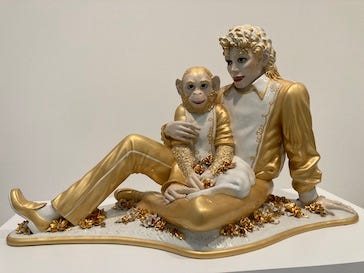Hello Friends,
A few months ago, I told you about seeing Edward Ruscha’s huge painting where he recreated marbled paper and I thought, maybe we should all be painting the big painting. And we should! When I was thinking about that and writing about it, I had recently been in a room full of larger than life art, like Jeff Koons’ huge statue of Michael Jackson and Bubbles. ¯\_(ツ)_/¯
Big stories! Complicated plots! Epic sagas! Many-layered storylines! That’s where my brain was when I was writing that. That’s what we think, at least us in publishing, when we think of a BIG book. Maybe that means something longer, maybe not.
There’s a big book, and then there’s a big hook.
What I’ve been thinking about more recently are books that take a big swing, in a different way than scope or length or epicness. I’m thinking of books that don’t shy away from what could be. Books that put their characters in situations well out of the norm, and not just in science fiction or fantasy. Some might call this a big hook. I see lots of novels where interesting things happen to interesting people, and that’s great. I’ve written a couple of those, too. But I’m starting to think, starting to realize, that’s how books get called “quiet.” If those people are merely interesting, and not much more, then it’s easy for readers to pass it by. I see hundreds of interesting things a day and few hold my attention. What else can your book be besides interesting?
I wrote in my forthcoming book this exercise I do when I’m plotting. I have to get the low-hanging fruit out of the way, so I write a list of lots of things that could happen to my characters/my characters could do. It looks a little like this.
My Main Character could write a book.
My MC could find a lost book.
My MC could find her grandmother’s lost book.
MY MC could find her grandmother’s lost book that got her killed.
My MC could find a lost book that solves the murder of her grandmother.
Now, I’ve seen books about long cold murders solved by newly found journals or books or letters. So maybe that isn’t the best example, but I think you get my point. Why couldn’t it be My MC finds a lost book that solves the murder of her grandmother in space? Why not? Why can’t it get bigger and bigger and bigger? Why does my character have to be limited by what I could conceivably do? If I don’t know how to write something like that, can I learn? Does it excite me enough to figure it out?
You have to step back from the edge of ridiculous, of course. There’s only so many books like The Hitchhiker’s Guide to the Galaxy for a reason. You can strain a reader’s credulity, and there’s little coming back from that. And bigger doesn’t have to mean fantastical, otherworldly, or supernatural. It can, but my goal isn’t for y’all to start writing SF/F and flood the market. My goal is to encourage you to let your characters do bigger shit. Go farther, leave their comfortable neighborhoods, seek more. Take a big swing at a plot, even if you are aiming for more “literary” work. If you’ve created a tidy world with conflict and stakes, that’s great. That’s what you’re supposed to do. Now how can you fuck it up even more? How can you make your characters want more, try for more, fail more?
The market is tough out there. If you want to stand out, taking a big swing is one way to do it. You might fail. You might fail if you take a little swing, too. But at least you failed at something ambitious instead of safe. Anyone can fail at safe.
Sorry non-fiction writers. I’ll admit I’m talking mostly about novels here but I’m sure there are big swings you can take that apply to your books, too. Tell me about them in the comments.
OXOXOXOXXO,
Kate




I’d rather “fail” knowing I wrote what I wanted to write rather than writing what I think others want to read.
Thanks!
The timing on this! I feel like I’ve given myself whiplash over the last year with all the faces of my debut. It’s fun to read what I wrote at the start and to see where it’s going, especially since it’s only in the last month or two I’ve started to think like this. What once started as a rather quiet book (personally, I love books like this but I also get it’s a tough sell) is slowly morphing into something a little bit louder.
My biggest struggle has been striking a balance between staying true to my original vision — the heart of the characters more than anything—and making it pop with just a little more nuance and drama.
Thank you for this post!